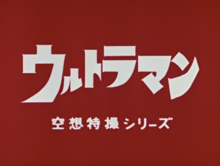Our website is made possible by displaying online advertisements to our visitors.
Please consider supporting us by disabling your ad blocker.
Ultraman (1966 TV series)
| Ultraman | |||||
|---|---|---|---|---|---|
 Original Japanese title card | |||||
| Also known as | Ultraman: A Special Effects Fantasy Series[1][2] | ||||
| Japanese name | |||||
| Kanji | ウルトラマン | ||||
| |||||
| Genre | |||||
| Developed by | Eiji Tsuburaya[6] Tetsuo Kinjo[6] | ||||
| Starring | |||||
| Opening theme | Ultraman Theme by the Misuzu Children's Choir | ||||
| Composer | Kunio Miyauchi | ||||
| Country of origin | Japan | ||||
| Original language | Japanese | ||||
| No. of episodes | 39 | ||||
| Production | |||||
| Running time | 24 minutes | ||||
| Production companies | Tsuburaya Productions TBS | ||||
| Original release | |||||
| Network | JNN (TBS) | ||||
| Release | July 17, 1966 – April 9, 1967 | ||||
| Related | |||||
| Ultra Q Ultraseven | |||||
| Infobox instructions (only shown in preview) | |||||
Ultraman (Japanese: ウルトラマン, Hepburn: Urutoraman)[a] is a Japanese tokusatsu science fiction television series created by Eiji Tsuburaya. Produced by Tsuburaya Productions, it is a follow-up to Ultra Q, though not technically a sequel or spin-off. Tsuburaya Productions produced 39 episodes (40, counting the pre-premiere special) that aired on Tokyo Broadcasting System (TBS) and its affiliate stations from July 17, 1966, to April 9, 1967. Its premiere topped the average rating set by Ultra Q and kept climbing each week, marking the show as a success.[7] It was also the first Japanese television series to use a bidding system for commercial rights, allowing multiple third-party companies to sponsor the show. This was following TBS's merchandising troubles with its predecessor.[8]
Although Ultraman is the first series to feature an Ultraman character, it is the second installment in the Ultra Series, following Ultra Q. This is symbolised by the Japanese show opening with the Ultra Q logo exploding into the Ultraman logo. Ultraman and its titular hero became a major pop culture phenomenon in Japan, generating dozens of sequels, spin-offs, imitations, parodies and tributes.[9][6] Ultraman went on to generate $7.4 billion in merchandising revenue from 1966 to 1987 in Japan[10][11] (equivalent to more than $20 billion adjusted for inflation) and become the world's third top-selling licensed character by the 1980s, largely due to his popularity in Asia.[12]
A manga series of the same name serving as a sequel to the television series began publication in October 2011 and received an anime adaptation starting in April 2019. In May 2022, Toho released Shin Ultraman, a reimagining of the series directed by Shinji Higuchi.
- ^ a b Cite error: The named reference
DVD Talkwas invoked but never defined (see the help page). - ^ a b "55th Anniversary Ultraman Archive: Ultraman MovieNEX Remastered Japanese Blu-ray Release in November". SciFi Japan. November 2, 2020. Archived from the original on December 12, 2020. Retrieved December 11, 2020.
- ^ Satake, Shinichi (January 1, 2016). "Ultraman: 50 years battling monsters". The Japan Times. Archived from the original on November 8, 2020. Retrieved November 8, 2020.
- ^ Schilling, Mark (November 12, 2006). "Ultraman . . . forever". The Japan Times. Archived from the original on August 28, 2019. Retrieved November 8, 2020.
- ^ Vlessing, Etan (December 11, 2018). "Japanese Superhero 'Ultraman' Reboot in the Works (Exclusive)". The Hollywood Reporter. Archived from the original on November 9, 2020. Retrieved November 8, 2020.
- ^ a b c Ragone 2007, p. 114.
- ^ Ragone 2007, p. 127.
- ^ "February 1979". Merchandising Report. 1979.
- ^ Alt, Matt (July 16, 2016). "Ultraman: Ultracool at 50". The Japan Times. Retrieved February 7, 2018.
- ^ "Brand News" (PDF). 4kidsentertainment.com. 2003. p. 4. Archived from the original (PDF) on April 8, 2003. Retrieved March 26, 2022.
- ^ "Properties-Ultraman". 4kidsentertainment.com. Archived from the original on February 28, 2005. Retrieved January 1, 2017.
- ^ Warner 2005, p. 44.
Cite error: There are <ref group=lower-alpha> tags or {{efn}} templates on this page, but the references will not show without a {{reflist|group=lower-alpha}} template or {{notelist}} template (see the help page).
Previous Page Next Page


